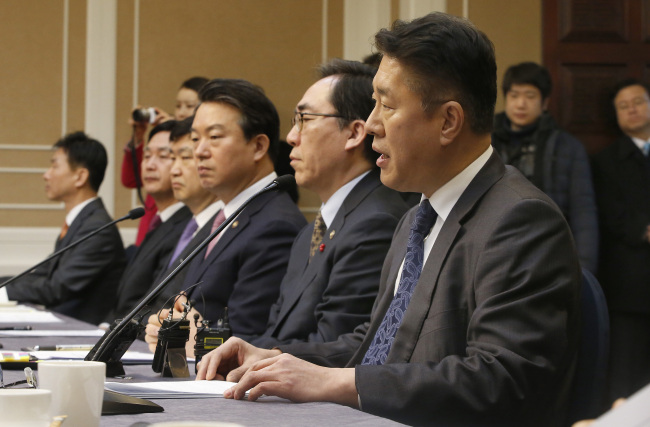The government and ruling party are ramping up their push to ratify antiterrorism bills that they said would help better fend off future threats, though controversy persists over an envisioned strengthening of the spy agency’s authority.
The Saenuri Party hosted a meeting Wednesday with the Foreign Ministry, National Intelligence Service and police to review possible terror threats posed by Islam fundamentalists and North Korean agents, as well as measures to counter them.
The Saenuri Party hosted a meeting Wednesday with the Foreign Ministry, National Intelligence Service and police to review possible terror threats posed by Islam fundamentalists and North Korean agents, as well as measures to counter them.

A spate of bills have been proposed since the 9/11 attacks in 2001 involving steps to preclude physical and cyberterrorist acts and trail the potential perpetrators’ money trail and network. But they have never been put to a floor vote due chiefly to the resistance of the opposition camp, which is concerned it would make way for the scandal-ridden NIS to boost its spying activities on civilians and political maneuvering in particular during election seasons.
The legislation drive has been picking up momentum following the surge of the Islamic State and especially the jihadist group’s brazen attacks in Paris last November and more recently Jakarta, which incurred injuries on a South Korean tourist for the first time.
“We can’t sit idly, knowing nothing about when and where a contingency would break out,” Saenuri Rep. Lee Cheol-woo, a member of the National Assembly’s intelligence committee, told reporters after the gathering, relaying the administration’s request for the opposition’s cooperation.
In an apparent fresh bid to intensify pressure on the critics, the NIS unveiled during the session that the seven migrant workers deported for extremist activities were found to have joined the IS after their departure.
The seven were among 51 foreigners who have since 2010 been expelled for their links with international terror organizations, the agency reported, raising its urgent need for antiterrorism eavesdropping and finance-tracking operations.
“The passage of antiterrorism bills is now even more vital given the possibilities for a spread of terror threats to East Asia in the aftermath of the Indonesia case,” Vice Foreign Minister Cho Tae-yul said at the meeting.
“Last week’s incidents were committed by terrorists who aimed for soft targets in everyday settings such as tourists and thus made it difficult to sense their acts in advance. That means our response, too, should be more detailed and sophisticated.”
Despite the unabated controversy, the ruling party left little room for negotiation with the opposition, with chief policymaker Rep. Kim Jung-hoon saying it is “so natural for the NIS to take the driver’s seat, as safety and security form the basis of the antiterrorism law.”
Kim Soo-min, the NIS’ second deputy director, criticized opponents for focusing on undercutting the agency while turning a blind eye to public safety.
“The NIS is not interested in reinforcing its authority or status at all,” he said. “We’ve been pushing for bills with sincerity that we will fulfill our duties of protecting the people from atrocious terror threats.”
By Shin Hyon-hee (heeshin@heraldcorp.com)



![[Herald Interview] 'Amid aging population, Korea to invite more young professionals from overseas'](http://res.heraldm.com/phpwas/restmb_idxmake.php?idx=644&simg=/content/image/2024/04/24/20240424050844_0.jpg&u=20240424200058)















